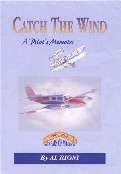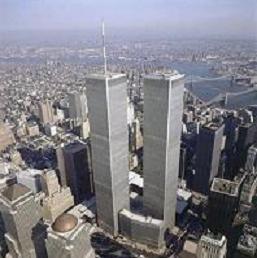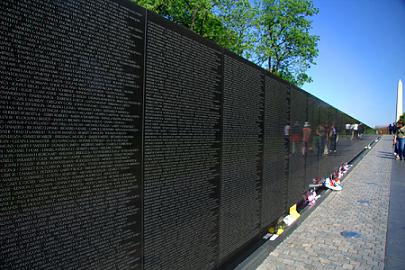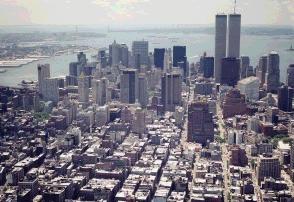

**
"Catch the Wind" is a collection of personal flying memories written for pilots and non-pilots alike.
**
"Catch The Wind" was begun on the 100th anniversary of the Wright Brothers first airplane flight.
**
The book is the story of the life and thoughts of a new and inexperienced pilot flying in an intense aviation environment.
**
There is 300 pages of aviation information describing not only what it's like to be a pilot, but also including descriptions of some unusual and interesting events and some unusual and colorful characters.
**
"Catch The Wind" was originally published for distribution to family and friends only, but, after the very positive and enthusiastic response to the unique stories, the book is now available to the public.
**
The true stories take place during the turbulent 1960's and 1970's, with many historic events occurring during that time period recalled within the pages.
*** This book is a look back at the carefree and loosely regulated flying days before stricter enforcement of the FAA Regulations began in the 1980 s. The stories in "Catch the Wind" highlight the huge differences between this almost unregulated aviation world of earlier days as compared to the rigidly enforced FAA Regulations following the events of September 11 - 2001.
**
The events described in this book could never be repeated today.
**This book is also a nostalgic look back on an age of innocence, not only on the subject of aviation, but also on the subject of life in America in the 1960 s and 1970 s.
**
It was an age of wonderful freedom.
**
As these stories will show, nowhere was this freedom more apparent than in the world of aviation.
__________________________
Chapter Excerpts
Chapter 3
Piece of Cake
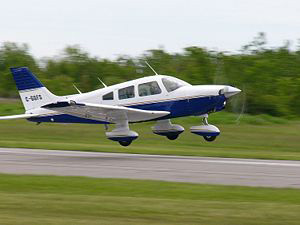
**
This chapter describes what it's like learning to fly.
**
It tells of the problems and challenges a student
pilot faces when trying to fly alone in an airplane
after only a few hours of flight lessons.
(EXCERPT)
**
"As mentioned earlier, my flight training had been sporadic, to say the least. I spent most of my time working and worrying about how to get the money for the next lesson. I didn t spend a lot of time at the airport between lessons and rarely talked to other students.
**
Therefore, taking off that evening, although I should have known better, I was completely unaware that student pilots do not fly at night, nor, that flight within the clouds, without an instrument rating, and without an Air Traffic Control clearance, is illegal.
**
As I learned to drive a car a couple of years earlier, and as there was no special training required to drive a car at night, I never even considered that there may be any difference between day flying and flying at night.
**
So, that evening, I just kept on going into the darkness".
**
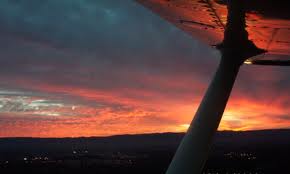
**
"(Night flying is, in fact, very different and much
more difficult than flying in the daytime.
Many things, such as the ground, the horizon
clouds, obstructions, airports, and other things,
which are easily visible in the daylight, are much
more difficult to see and identify at night.
Distances are also much more difficult to estimate
at night.
Visual flying (VFR) at night is considered to be so
difficult and potentially dangerous that most
countries permit only instrument (IFR) flying at
night.
In fact, the US is the only country on Earth that
allows visual (VFR) flying at night.
IFR flights require the pilot to be licensed, have an
instrument rating, and be flying in accordance
with an Air Traffic Control clearance)".
Lots More Stuff In Chapter 3 . . . . . . .
Chapter 4
The Age of Aquarius
* * * * * * * *
**
**
I started flying in 1968.
**
"It was the best of times - It was the worst of times . . . .
**
Flying was something I always knew I would someday do, even as a little boy.
**
I don t know why . . . . I just knew.
**
Although it was an important year for me, a lot of bad things were happening in 1968. It was a year the people of the United States will never forget.
**
In 1968 the war in Vietnam was at its peak. Many young men were being drafted into the US Army for
service in this very unpopular war. Some avoided military service by enrolling into colleges or universities,
or in my case, in an advanced flight school in Florida".
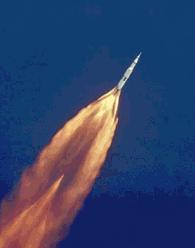
Spectacular Launch of Apollo 11 - July 1969
Lots More In Chapter 4 . . . . . . .
Chapter 11
Chateau de Amour
OR
(The Last Farewell . . . .)
****
( A pilots life is not just a life of flying. . .
Sometimes the excitement and the nature
of the aviation world can create situations
which become deeply personal and can
affect someone for a lifetime.
**
One never knows when they will occur. This chapter tells the story of a
chance encounter during a charter trip to Canada
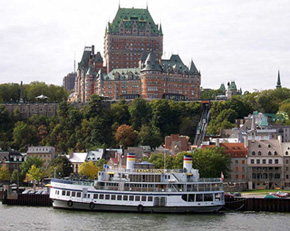
Chateau Fountainbleu Hotel - Quebec City
(EXCERPT)
"The next day, I took Nicole for a ride in the Twin-Commanche.
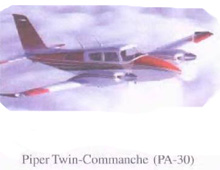
We flew over the Chateau Fountainbleu, the Old Town, and the St. Lawrence River.
**

My Beautiful Nicole
***
She was absolutely exuberant and excited.
**
I let her fly the airplane from the co-pilots seat.
**
It was obvious she was very intelligent.
**
She learned quickly and was soon flying very well.
**
We shared some intimate moments while the autopilot flew the airplane high over Quebec City.
**
I made the landing with Nicole following me through on the controls.
**
Afterwards, she was so excited it took a long time for her to calm down.
**
Although always affectionate, she was particularly warm and passionate in our hotel room that night."
***
Flying a high-performance airplane into an encounter with someone like Nicole is one of the many things that makes professional flying the unique career that everyone seems to envy.
Lots More In Chapter 11 . . . . . . .
Chapter 5
Pennies From Heaven
OR
(The High and the Mighty)
**
(I guess everyone must have their own impression
of what a career in aviation might be like.
Things don t always turn out to be the way one
would expect).
**
"My first day at my new job as flight instructor was not
what I expected.
**I thought I would be conducting a routine training flight with a new
student pilot. . . . . I was not prepared for the near disaster that was about to occur".
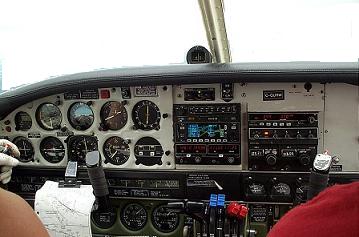
Lots More In Chapter 5 . . . . . . .
Chapter 6
Nantucket Sleigh Ride
OR
(He ain t Heavy . . . He s my Brother)
* * * * * * * * * *
**
Some of the events described in this book might
be considered as foolish, but, we were young and
flying was a lot different in those days.
**
There was a certain amount of independent spirit
among pilots in those days of freedom.
**
It seemed like we could do whatever we pleased.
**
Many of us flew with the memories of the Original
Seven Mercury Astronauts, (who were famous for
their un-orthodox flying antics), and with the likes
of legendary pilot, Wrong Way Corrigan **, and
other independent spirits in our minds.
**
"In 1971, I was working at my first job as a flight instructor at
Barnes Airport in Westfield Massachusetts.
***
I made many good friends while at this job.
****Friends should always help each other.
****This is a true story of how this desire
to help a friend can affect a pilot's good judgement".
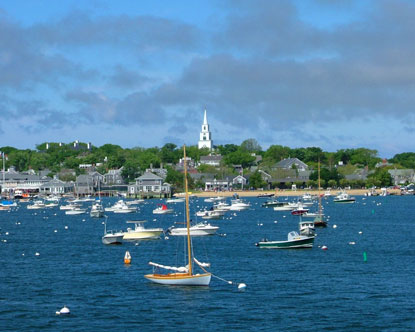
Harbor at Nantucket Island
Lots More Stuff In Chapter 6 . . . . . . .
Chapter 8
Jefferson Airplane
OR
(Don't Think Twice - It's All Right)
***
( Among pilots, there is a common saying used to
describe aviation. It is that flying is hours and
hours of boredom, occasionally punctuated by a
few brief moments of stark terror .
**
Sometimes, when you least expect it, a routine
and familiar event can turn into one of these
terrifying moments.
**
Although I have spent a lifetime in the field of
aviation and feel completely safe and comfortable
in the air, it must be noted that I never assisted
anyone I love in learning to fly ..)
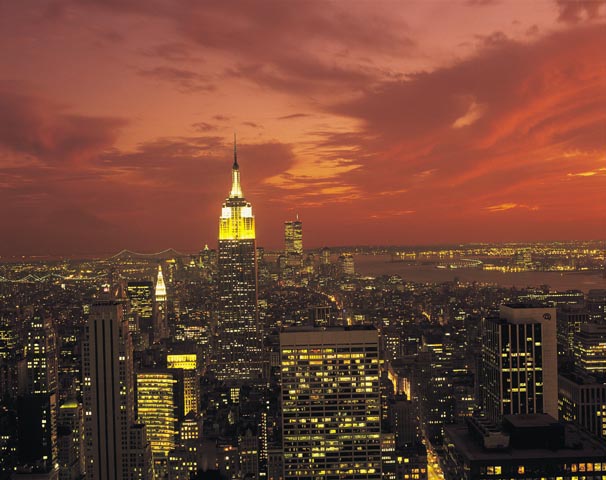
New York at Night - 1972
Lots More Stuff In Chapter 8 . . . . . . .
Chapter 10
A Wing And A Prayer
OR
(Magical Mystery Tour)
***
(People, especially young people, sometimes do
very foolish things.
***
Unlike military flyers, civilian pilots don t get the
chance to prove our bravery in combat.
***
However, we still like to complete our missions as
planned and don t like to fail.
***
Sometimes, during periods of great challenge, in
order to complete our flights, we may push ourselves
beyond the limits of reason and caution.
***
We try not to let this happen, but sometimes it does).
***
This chapter is loaded with valuable information on aircraft icing, instrument flying, and the Air Traffic Control System.
Lots More In Chapter 10. . . . . . .
Chapter 13
Garden Party
***
( All pilots must have stories of incidents they
have experienced that are unusual and life-
threatening.
**
I don t know if I ve had more of these kinds of
experiences than other pilots, but it sure seems
to me that I have.
**
One such incident, out of many, comes to mind.
It involved something as innocent sounding as
the airplanes cabin heater ).
****This chapter is dedicated to the memories of teen-idol Ricky Nelson and the six others killed in that fiery Texas crash.
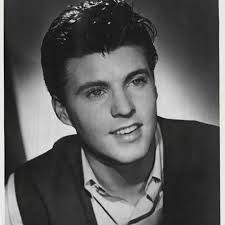
Lots More In Chapter 13 . . . . . . .
Chapter 14
Earth, Wind, and - - - - -
OR
(Those Lazy-Hazy-Crazy Days of Summer)
***
( In order to safely operate our airplanes,
professional pilots must be well rested, must keep
our minds on our flying, and must try not to allow
our personal thoughts and pressures to affect our
judgment. )
****
"The airplane was falling tail first in a full stall condition . . . . . . . the left main landing
gear hit the runway first and collapsed immediately . . . . . . . . the left wing was being dragged along
the runway and was trailing a huge plume of red and orange sparks . . . . . . . my right temple slammed
into the windshield . . . . . . . . I lost consciousness."
Lots More In Chapter 14 . . . . . . .
Return To Homepage
|

